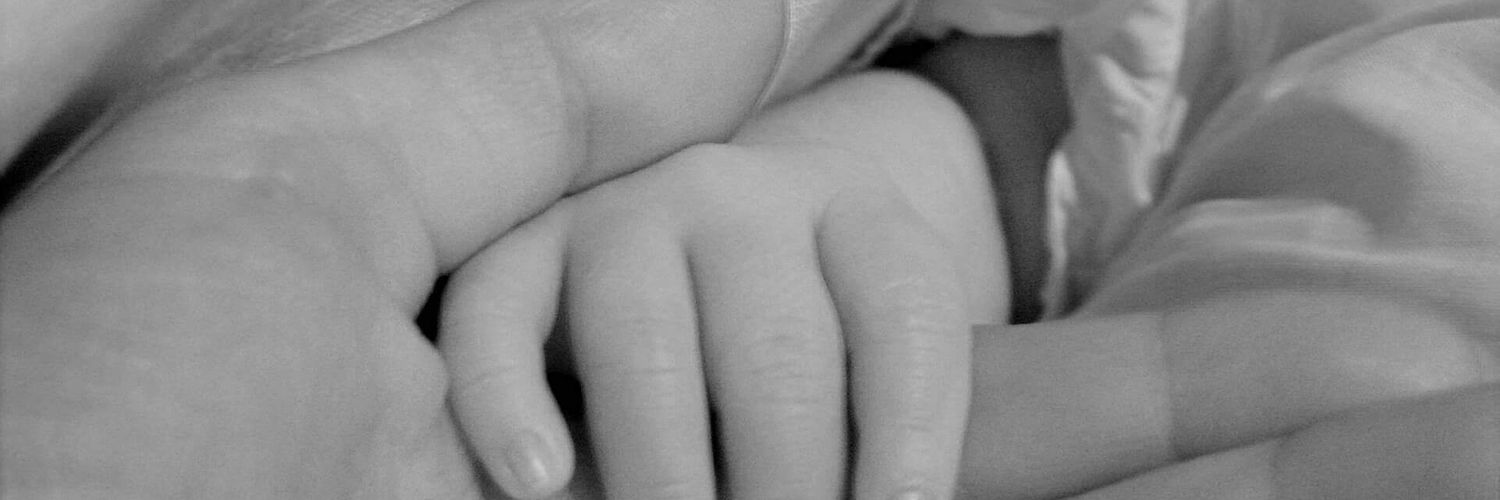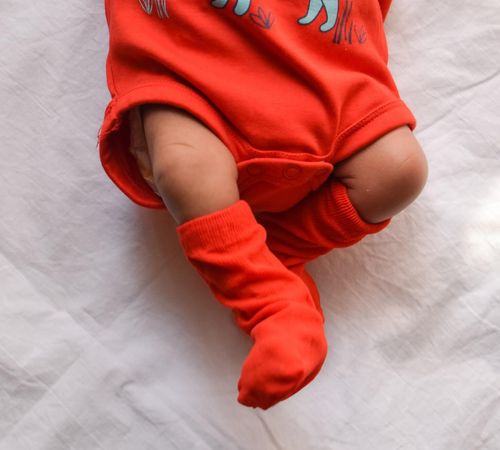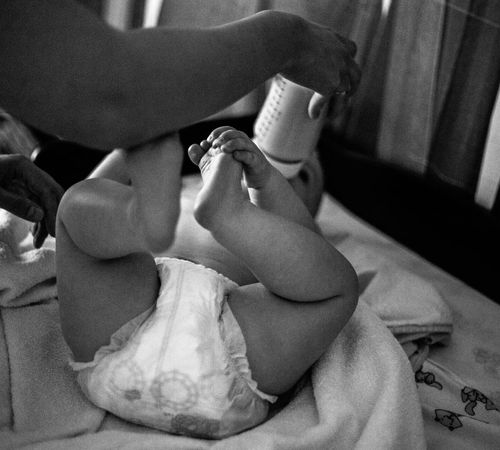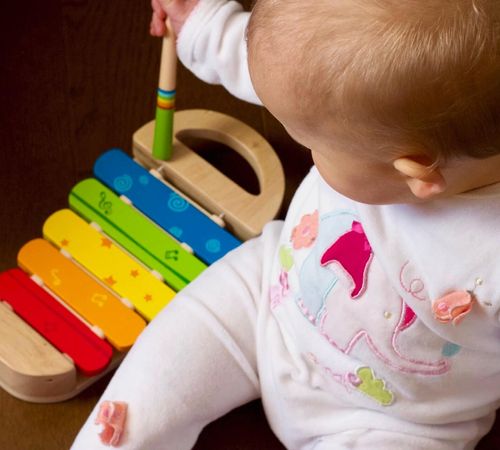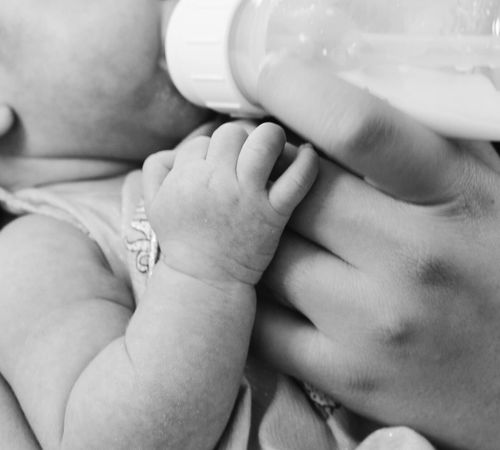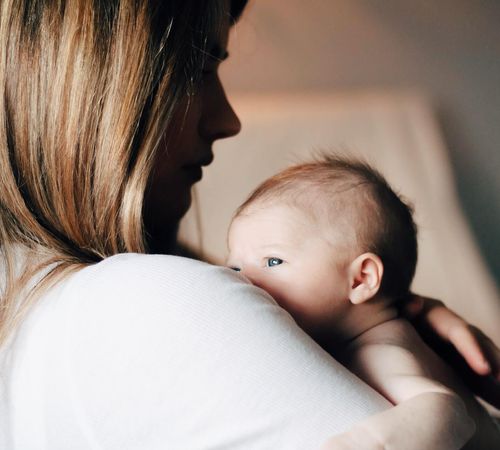Let's learn about the real reasons why your baby is waking at night that have nothing to do with self-settling and what you can about them.
It's 2 AM. It's dark. The whole world is sleepings beside you and that baby.
"Why?" you ask yourself. It cannot be so difficult to sleep.
It's not difficult to sleep, but when it comes to baby sleep, it surely can be complicated. Because let me tell you one thing: baby sleep is not similar to adult sleep. Sometimes it even goes in the opposite direction.
How Many Wakings Are Normal?
The question of all questions: How many night wakings are actually normal? While sleep always differs from baby to baby, there is a range for every age:
Number of biologically normal night wakings:
- 0-3 months: 3-6 night wakings
- 4-6 months: 1-3 night wakings
- 7-9 months: 1-3 night wakings
- 10-12 months: 0-3 night wakings
- 13-16 months: 0-2 night wakings
- 16-24 months: 0-1 night waking
Reasons Why Your Baby Is Waking And Their Solutions
There are several good reasons why your baby is waking. Let's take a closer look and see what you can do about it.
Reason 1: Hunger
This is one of the most common reasons young infants and babies wake up. During the first three months, your baby's stomach is very small and can only hold small amounts of milk. After that, babies can have larger meals and go longer than 2 hours without a meal, but they still need feeds every 3-5 hours. Even when your baby starts solids, their main nutritional intake comes from milk.
Solution: There is not really much to do than feed your baby. I am pretty sure that no parent wants to lay in bed and wonder if their waking baby is hungry.
Even though there is this widespread misconception that babies who start solids do not need to feed anymore, this is not true. If you think about it: a calorie-rich milk feed usually gets replaced by a low-calorie vegetable puree. They will still need those feeds at night, even if they start to eat. I want to remind you that even if your baby is not feeding at night, they can wake if they have not hit that developmental milestone yet.
I don't recommend night weaning until your baby has established 3 solid meals. In the meantime, you can try to have full feeds instead of half feeds and have your last full milk feed 30-40 minutes before bedtime. This might give you a good first stretch at night.
Reason 2: Protective Wakings
Whenever I talk about this, I am amazed over and over again at how incredible our body is. Your baby's night waking protects them from possible risks, including SIDS (sudden infant death syndrome), a low heart rate, or a breathing problem. Your baby stays more in light sleep than deep sleep, so it is easier for them to wake and for us to react. Research shows that babies who died of SIDS lacked the ability of arousal.
Solution: Night wakings have such a bad reputation but isn't it a blessing to have such an amazing alarm system? 90% of SIDS cases happen in the first 6 months. After that, the chance of dying of SIDS decreases. Even though SIDS is always unpredictable, it is rare to happen after one year. So in the first year, and especially in the first 6 months, we should not obsess about eliminating all night wakings and especially not ignoring them but instead try to make sleep less disruptive and how we can fall back to sleep fast. The right sleep environment and healthy sleep habits for both baby and parent are key.
Reason 3: Emotional Reassurance
Young children thrive on closeness and touch with their caregiver. While we sometimes feel touched out, they cannot get enough of it, right? Research has even shown that ill babies get better faster through a lot of skin-to-skin contact. Unfortunately, the sleep industry seems to ignore that having an emotional need to be close to a parent is a natural urge.
Solution: Babies and toddlers have a sensory and an emotional cup. The sensory cup represents activities and stimulation. The emotional cup represents positive emotions and human connection. Both cups should ideally be filled every day. Have a lot of one-on-one time with your baby, nurse frequently, and have a lot of cuddles, especially before bedtime. Bedtime means separation, and babies know that. Filling your baby's emotional cup can help them sleep better.
Reason 4: Undertiredness/ Too Much Daytime Sleep
Sometimes the amount of sleep consultants recommend is insane to me. A baby sleeping 12 hours every night and 4 hours during the day - that's 16 hours and A LOT! Most babies sleep 10-11 hours at night. Yes, babies need a lot of sleep, but often times parents have too high expectations when it comes to the amount. They try to tuck in a baby that is not tired enough at 7 PM and wonder why their baby wakes at 6 AM. But an undertired baby will wake more often at night and will wake more early.
Solution: Baby sleep needs are very individual. My children both gave up their last nap of the day at 2.5 years. And I know children that still nap at 4 years and go to bed at 8 PM. But that is not the majority. There is a range how much sleep a baby at every age needs. And the rest is figuring it out through trial and error. Learn your baby's tired signs and natural waking hour. This way, you will learn how much sleep they approximately need.
Reason 5: Overtiredness
Parents fear an overtired baby for sure. I mean, it's the enemy, right?
Your baby is exposed to a lot of stimulation throughout the day: noise, light, people. It's a lot to take in for such a little thing. Especially newborn babies are very sensitive to stimulation.
While your baby is awake, their cortisol levels rise. By having a nap, their cortisol levels decrease again. The younger the baby, the more naps it needs to restore and process all the stimulation.
Now, if you put your baby to sleep too late, their cortisol levels are already very high. And it's hard for them to fall and stay asleep with all that stress bundled up in their body. They will wake after every sleep cycle because their body still has so much cortisol, which prevents them from continuing to sleep.
Solution: In order to prevent overtiredness, you need to learn your baby's tired cues.
Typical tired signs or sleep cues are:
- pulling at ears
- yawning
- red eyebrows/ redness around the eyes
- turning head away
- losing interest in play
- losing patience
- blank stares
- becomes more attached or irritated
Once you notice one or more of these behaviors, it's time to get your baby ready for bed.
Also, a young baby's sleep will be more affected by overtiredness than a 2-year-old's. The older your baby gets, the less of a thing overtiredness becomes.
Reason 6: No Ideal Sleep Environment
Babies have different sleep patterns than adults and wake much easier from environmental disruptions than adults. Their sleep cycles are shorter, and every time they switch from one sleep cycle to another, they wake up easily if something slightly bothers them. This can be noise, temperature, light, uncomfortable clothing, or a full diaper.
Solution: Make sure to create a sleep-inducing environment for your baby. Use black-out curtains to prevent light from coming in. A white noise machine will mask unwanted noises. Control the temperature with a thermometer and a sleep sack. Just make it as comfortable (and safe) as possible for your baby.
Reason 7: Discomfort
A sick baby or a baby dealing with any illness or discomfort will wake up more often at night. While sleep is what you need to get better, it is very difficult to sleep when you feel unwell.
Solution: There is really nothing to do than to be with your child. Whenever my children are sick, I manifest as often as possible that this will pass, and it's only a very short period. I repeat this over and over again and try to get rest any possibility I get. Sleep with them during the day, do fewer household chores, and go to bed early.
If you fear that your little one is constantly suffering from discomfort, for example, because of gas or reflux, consult with your doctor.
Reason 8: Developmental Milestones/ Leaps/ Environmental Changes
Who does not love a baby that stands up in the middle of the night in the crib and does not know how to sit down again by themselves? Babies are so engaged when it comes to learning new things. Whether it's talking or crawling or standing up, they will practice at every opportunity they get, even at night.
But also, other developmental milestones such as a sleep regression and environmental changes can lead to poorer sleep. A new home or start of daycare can impact your baby's sleep quality.
Solution: Help your baby get through those milestones with a lot of attention. Help them practice their new skills a lot during the day. Have as much one-on-one time with your child as possible to fill that sensory cup.
Reason 9: No Consistent Routine
In the beginning, infant sleep is very unpredictable. Your little one's circadian rhythm is not developed yet, and they have no regular sleep pattern of sleeping and being awake. Their sleep is all over the place. They might sleep during the day and party all night.
But not only an undeveloped sense of day and night will lead to night wakings. Also, an irregular day and a missing routine can lead to poorer sleep at night.
Solution: Help your baby develop that circadian rhythm by exposing them to day and night cues. Expose them to a lot of light during the day and keep it dark and quiet at night.
After 2 months, most babies show regular patterns of sleeping. You can start having your baby on a very loose sleep schedule to have somehow consistent sleep times. Having repetitive patterns during the day, such as the dame meal and nap times, as well as a bedtime routine, will help them sleep better at night.
Reason 10: Habitual Wakes In Older Babies and Toddlers
Habitual wakes can be a thing for some babies and toddlers. Maybe you have experiences that your baby is waking every night at the very same time. Or your toddler is waking outside the normal range and needs a strong sleep association such as breastfeeding or rocking to fall back asleep. In this case, it is possible that your baby was due to a strong dependency. It doesn't mean it's bad, and you have to eliminate it. But there might be some parents who would want to do something about it.
Solution: You can try to promote more independent sleep with gentle sleep training (I never recommend CIO). For younger babies (4-9 months), I suggest replacing rocking or nursing back to sleep (if baby is not hungry) with a less active sleep association such as patting or stroking. If you have an older baby or toddler (10 months +), you can try placing them into their crib more often to fall asleep there. If your baby feeds a lot at night, you can try eliminating a night feeding by stretching it out. There are a lot of possibilities to reduce those night wakings in gentle ways.
For more help on how to help your baby sleep better at night naturally, you can check out my gentle sleep program!


